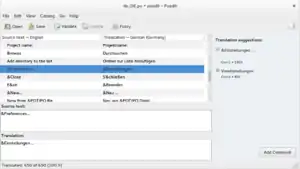Poedit
Poedit (formerly poEdit) is a shareware and cross-platform gettext catalog (.po file) editor to aid in the process of language localisation.
 | |
| Developer(s) | Václav Slavík |
|---|---|
| Initial release | 2001 |
| Stable release | 2.3[1]
/ February 3, 2020 |
| Repository | |
| Written in | C++ |
| Operating system | Windows, macOS, Unix-like |
| Platform | Cross-platform |
| Available in | Multilingual |
| Type | Computer-assisted translation |
| License | Basic version: MIT License Pro version: Shareware - Windows, macOS |
| Website | poedit |
It is written in C++ and depends on some subclasses from the wxWidgets, but utilizes graphical control elements from the GTK+ library.
Features
- Unlike other catalog editors, Poedit shows data in a very compact way. Entries are arranged in a list, so that you can easily navigate large catalogs and immediately get an idea about how much of the catalog is already translated, what needs translating, and which parts are only translated in a "fuzzy" way.
- Runs on Unix and Windows systems.
- Plural forms support.
- Features whitespace highlighting.
- Fuzzy and untranslated records are highlighted and displayed at the top of the list.
- Automatic compilation of .mo files (optional).
- Automatic headers update.
- References browser lets you see where and in what context a string is used.
- You can use Poedit to scan source code for translatable strings.
- Integration with KDE and GNOME desktops. Neither of these environments is required; support for them is strictly optional.
- UTF-8 support. Poedit understands all encodings supported by the operating system and works in Unicode internally.
- Support for conversion between line-ending formats (useful if you need to edit catalogs by hand under Windows).
- Translation memory automates translation of frequent phrases. Poedit can reuse translation data from all your PO, MO and RPM files.
- Search dialog for quick navigation in the catalog.
- Editing of comments is permitted.
- Catalogs manager.
- Unicode support on Windows NT/2000/XP (partial Unicode support on Windows 9x). Full Unicode support under Unix with GTK+ 2.x.
- Spell-checking based on GtkSpell (GTK+ 2.x).
References
External links
This article is issued from Wikipedia. The text is licensed under Creative Commons - Attribution - Sharealike. Additional terms may apply for the media files.
